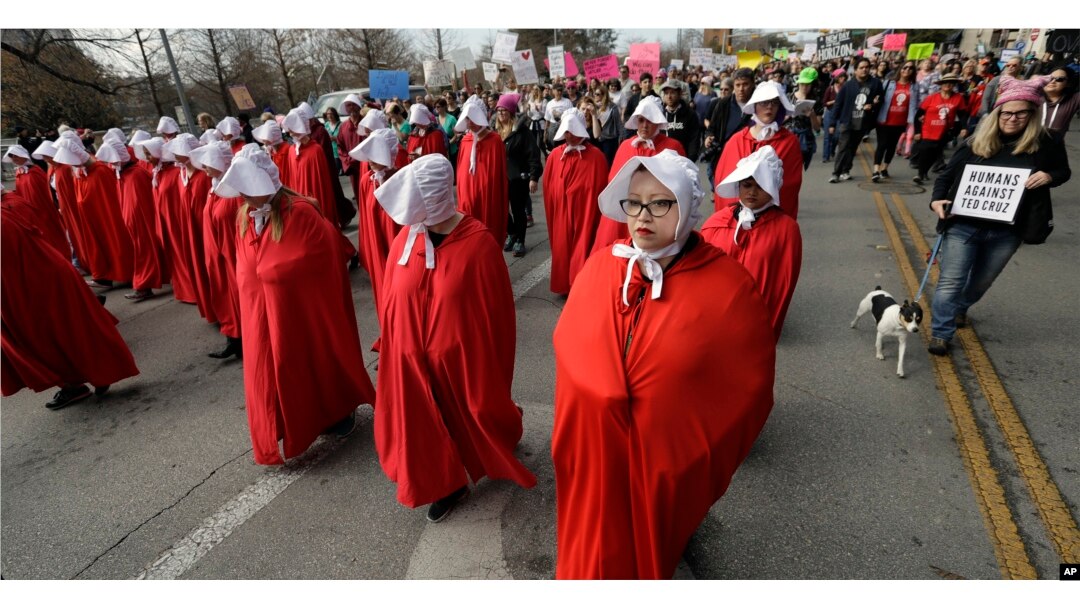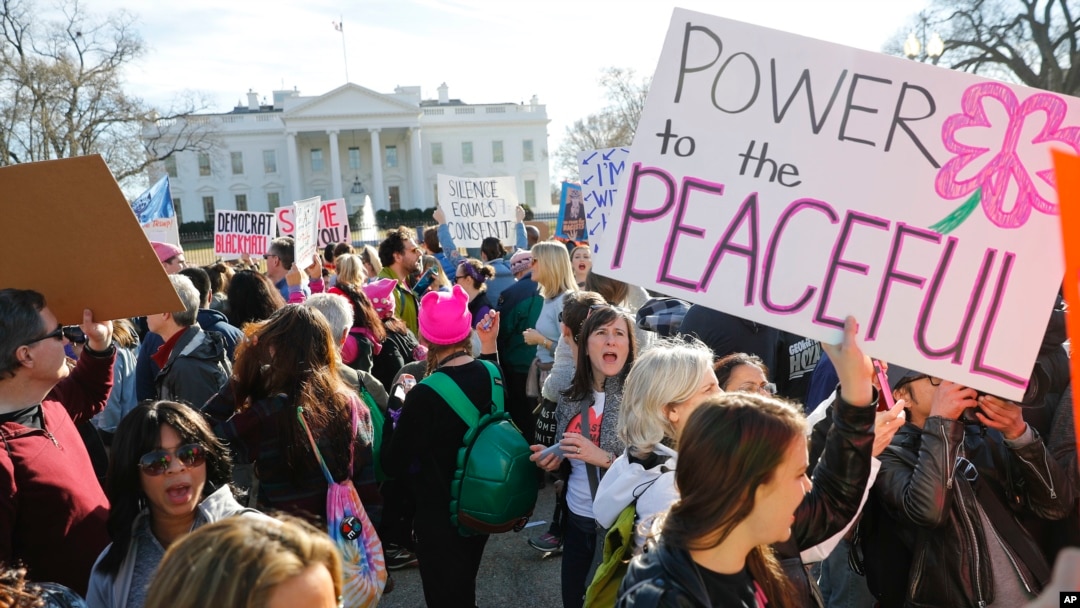The mayor of New York City, Bill de Blasio, said more than 120,000 protesters turned out in Manhattan to attend the day’s march for women’s rights, as hundreds of thousands of others did in cities around the country.
The Women’s March 2018 took place on the anniversary of the inauguration of President Donald Trump, and many of Saturday’s demonstrators expressed displeasure with him in their signs and apparel, which included the double-pointed, pink “pussy hats” made popular last year in reference to an off-color remark Trump made on tape years before winning the presidency.
The women gathered to call for equal rights in pay and health care, to denounce sexual harassment, and to encourage women to run for office.

Members of the "Texas Handmaids" lead a women's march to the Texas State Capitol on the one-year anniversary of President Donald Trump's inauguration, Jan. 20, 2018, in Austin, Texas. The costumes are a nod to "The Handmaid's Tale," a novel and television series that tell the story of a dystopian future in which women's rights are suppressed and a class of women are used solely for reproductive purposes.
Marchers also addressed other issues, such as racial equality, gun control, immigrant protections, and conservatives’ efforts to defund Planned Parenthood.
WATCH: Marches Draw Hundreds of Thousands Across the US
Your browser doesn’t support HTML5
Marches Draw Hundreds of Thousands Across the US
Sexual misconduct
The rallies are meant to follow up last year’s women’s march that took place immediately after the inauguration of President Trump. Many women at that march indicated their opposition to the current president, who has been accused of sexual misconduct by at least 19 women. The White House has said all the stories are untrue.
Trump tweeted Saturday about the march:
Over the past year, stories about unequal pay for women and sexual harassment by powerful men have come to the forefront of the national conversation. Dozens of men, including movie mogul Harvey Weinstein, Oscar-winning actor Kevin Spacey, NBC morning news host Matt Lauer, and Democratic Senator Al Franken, lost or resigned their jobs over allegations of sexual harassment.
Crowd estimates for the Washington march were down from last year. But marches also took place in other major cities: New York; Philadelphia; Los Angeles; Chicago; Denver, Colorado; Charlotte, North Carolina; and Palm Beach, Florida, where the president has a vacation home.
House Minority Leader Nancy Pelosi, D-Calif., center, Rep. Susan Davis, D-Calif, background center right, and Rep. Carolyn Maloney, D-N.Y., right, participate in the Women's March walk to the White House in Washington, Jan. 20, 2018. On the anniversary of President Donald Trump’s inauguration, people participating in rallies and marches in the U.S. and around the world Saturday denounced his views on immigration, abortion, LGBT rights, women's rights and more.
Run for office
In Washington, on the first day of a partial federal government shutdown, House Minority Leader Nancy Pelosi praised the women who have decided to run for office in the wake of the Trump election.
“They marched, and now they have run for office, and some of them have already won their office,” she told the crowd.
Lawmaker Don Beyer took the point even further: “I am sure that if Mitch McConnell, Paul Ryan and the president were women, we would not be in the middle of a government shutdown right now,” he said.
Senator Kirsten Gillibrand, considered by Democrats to be a possible presidential contender in 2020, said, “It’s women who are holding our democracy together in these dangerous times.”
She added, “To change the system, we need to change the players and have women at the table.”
People walk down Sixth Avenue as they participate in the Women's March in Manhattan, New York City, Jan. 20, 2018.
New York’s march featured a woman who won her local government seat in New Jersey after running against a man who publicly mocked the women’s march last year. At the kickoff to the event, Ashley Bennett told the crowd, “It is because you marched that I found the courage to make a change in my community.”
Actress Jane Fonda spoke at an event in Park City, Utah, where the celebrity-filled Sundance Film Festival began on Thursday.
“Everything is at stake,” she told her audience. “We’ve got to give it all we’ve got.”
Actress Viola Davis speaks at a Women's March against sexual violence and the policies of the Trump administration, Jan. 20, 2018, in Los Angeles.
And actress Viola Davis, at the Los Angeles rally, addressed the sexual-harassment issue specifically, referencing the #MeToo movement of women who have begun talking about their personal experiences with harassment. The topic is particularly sensitive in Hollywood, where the powerful players in the entertainment industry are overwhelmingly white and male.
“I am speaking today not just for the #MeToos, because I am a #MeToo,” the African-American actress said. “But when I raise my hand I am aware of all the women who are still in silence, the women who are faceless ... who don’t have the images in our media that gives them a sense of self-worth to break their silence.”
Marchers gather in the Grant Park area of Chicago, Jan. 20, 2018. (K. Farabaugh/VOA)
Las Vegas is holding its rally on Sunday to coincide with a voter registration drive. Organizers of the drive are targeting swing states (states where Democrats and Republicans have about an equal chance of winning) and hoping to register 1 million new voters.
Women also marched in Rome, Italy; Kampala, Uganda; Frankfurt, Germany; and Osaka, Japan, to protest sexual harassment. Marches were also planned in Beijing, China; Buenos Aires, Argentina; and Nairobi, Kenya.
Women's March for Equal Rights 2018
Women's March for Equal Rights 2018


